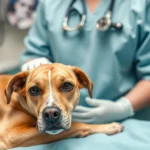
Traveling with your dog can be a rewarding experience, but it also comes with its own set of challenges—especially when it comes to their health care. Ensuring your furry friend remains healthy while exploring new places is crucial, and knowing how can I talk with a vet if I am on a trip with my pet is a question every pet owner should consider before hitting the road. Having a solid plan for veterinary care while traveling not only provides peace of mind but also ensures that your pet receives the best care if a health issue arises.
In this article, we will cover various aspects of traveling with your dog, including preparation, communication with veterinarians, emergency preparedness, and ways to maintain your dog’s health while on the go.
Preparing for Travel with Your Dog
Health Check Before Traveling
Before embarking on any journey, it’s vital to schedule a pre-trip vet check-up. This visit serves multiple purposes. Firstly, your vet can ensure that your dog is healthy enough for travel. Secondly, they can make sure that your dog is up to date on vaccinations. Many states and countries require proof of certain vaccinations, especially rabies, so having these records on hand is essential.
Additionally, discuss potential travel-related health concerns with your veterinarian. For instance, if you’re traveling to a region where ticks or heartworm are prevalent, your vet can recommend preventive treatments that will keep your dog safe during your trip.
Packing Essentials for Your Dog
When packing for your trip, don’t forget about your dog’s health and safety. Here’s a list of essential items you should take along:
- Medications: Bring any prescription medications your dog takes, as well as any over-the-counter medications recommended by your vet.
- First-aid kit: Include items like bandages, antiseptic wipes, tweezers, and a digital thermometer.
- Health documentation: Carry your dog’s health certificates and vaccination records. Many accommodations and pet-friendly locations may require this documentation.
Having these essentials packed will ensure that you are prepared for any health-related issues that may arise while traveling.
Finding Pet-Friendly Accommodations
Choosing the right accommodations can significantly impact your travel experience. Look for hotels, motels, or vacation rentals that specifically allow pets. Websites and apps dedicated to pet-friendly lodging can be great resources.
Additionally, make sure to check for nearby veterinary services. Knowing the location of a vet before your trip can save you time in case of an emergency. Some apps also provide a map of local veterinary clinics, making it easier to find one that can assist you.
Communication with a Veterinarian While Traveling
Utilizing Technology for Vet Communication
In today’s digital age, communicating with a veterinarian while traveling has never been easier. Telemedicine options for pets are on the rise, allowing pet owners to connect with veterinarians through video calls, chats, or messaging.
Several apps and platforms provide virtual vet consultations, making it possible to seek advice without physically visiting a clinic. This is especially beneficial when you’re on the road and need quick guidance or reassurance about a health concern.
When to Contact a Vet on Your Trip
Understanding when to reach out to a vet is crucial. Recognizing symptoms that require veterinary attention can help you determine the urgency of your dog’s condition.
- Emergency situations: If your dog is experiencing severe symptoms such as difficulty breathing, uncontrollable bleeding, or has ingested something toxic, contact a vet immediately.
- Routine inquiries: For less urgent concerns, such as dietary changes or mild allergies, a virtual consultation may suffice.
Preparing for a Vet Consultation
When preparing to contact a vet, gather all relevant information about your dog’s health history and the specific symptoms they are experiencing. This includes:
- Age, weight, and breed
- Any medications your dog is currently taking
- Detailed descriptions of symptoms or behavioral changes
Being concise and clear during the consultation can help the veterinarian provide accurate advice and guidance.
Finding a Local Vet
Researching Veterinary Services at Your Destination
Before traveling, take the time to research veterinary services at your destination. Simple online searches or dedicated pet care apps can help you find local vets.
- Online reviews: Check customer reviews and ratings to assess the quality of service provided by the veterinarian.
- Local recommendations: Ask local pet owners for their recommendations or consult your hotel or vacation rental host for suggestions.
Questions to Ask a New Veterinarian
When you arrive at a new veterinary clinic, it’s essential to ensure they are a good fit for your dog. Here are some key questions to ask:
- What are your qualifications and experience?
- What services do you offer, and do you have any specialties?
- How do you handle emergency situations and after-hours care?
Asking these questions can help you feel confident about the care your dog will receive.
Understanding Costs and Insurance
Veterinary care costs can vary significantly by location. Make sure to inquire about the typical costs for common services. If you have pet insurance, ask how it applies in different locations, as some policies may have restrictions on coverage based on geographical areas.
Understanding these financial aspects will help you budget for potential veterinary needs during your travels.
Emergency Preparedness
Creating a Pet Emergency Plan
Being prepared for emergencies is crucial when traveling with your dog. Create a pet emergency plan that outlines steps to take in case of a health crisis.
- Know the nearest veterinary hospitals: Research the locations and contact information of veterinary emergency clinics around your travel destinations.
- Have a backup plan: In case your regular vet is unavailable, identify alternative veterinary services nearby.
First Aid for Dogs on the Go
While you hope to avoid emergencies, it’s always best to be prepared. Here are some basic first-aid tips for common travel-related injuries:
- Cuts and scrapes: Clean the wound with antiseptic wipes and apply a bandage if necessary.
- Insect bites or stings: Remove the stinger if present and apply a cold compress to reduce swelling.
Handling Emergencies While Traveling
If your dog has a medical emergency, stay calm and act quickly.
- Transporting your dog: If transport is necessary, use a crate or secure your dog in the vehicle to prevent further injury.
- Contact a local vet: Call ahead to inform them of your situation, so they can prepare for your arrival.
Maintaining Your Dog’s Health While Traveling
Nutrition and Hydration
Maintaining your dog’s diet while traveling is crucial for their health. Sudden changes in diet can lead to gastrointestinal issues.
- Stick to their regular food: Bring enough of your dog’s usual food to last the trip. If you need to switch brands, do it gradually.
- Hydration: Ensure your dog has access to fresh water at all times. Carry portable water bowls and refill them regularly, especially on hot days.
Routine Care During Travel
Even while on the road, maintaining your dog’s grooming and hygiene is important.
- Regular grooming: Brush your dog regularly to remove dirt, debris, and loose fur.
- Exercise and mental stimulation: Take breaks during long drives to allow your dog to stretch, play, and relieve themselves. This helps reduce stress and keeps them healthy.
Monitoring Your Dog’s Health
Pay close attention to your dog’s behavior and health during your travels. Signs of stress or illness can manifest in various ways, including:
- Changes in appetite or drinking habits
- Lethargy or excessive panting
- Behavioral changes, such as increased aggression or withdrawal
Regular check-ins with your pet’s condition will help you identify any issues early on, allowing for timely intervention.
Conclusion
Planning for dog health care while traveling is essential for ensuring a safe and enjoyable experience for both you and your pet. Knowing how can I talk with a vet if I am on a trip with my pet prepares you for any health-related issues that may arise. By being proactive in your communication with veterinarians, researching local services, and maintaining your dog’s health during travel, you can focus on creating unforgettable memories with your furry companion.
As you prepare for your next adventure, keep these tips in mind to ensure a healthy and happy trip with your dog. Remember, a little preparation goes a long way in ensuring that both you and your pet enjoy the journey together.









